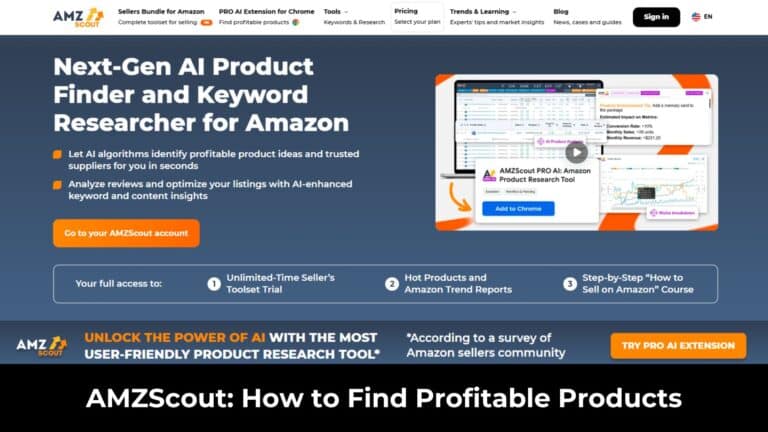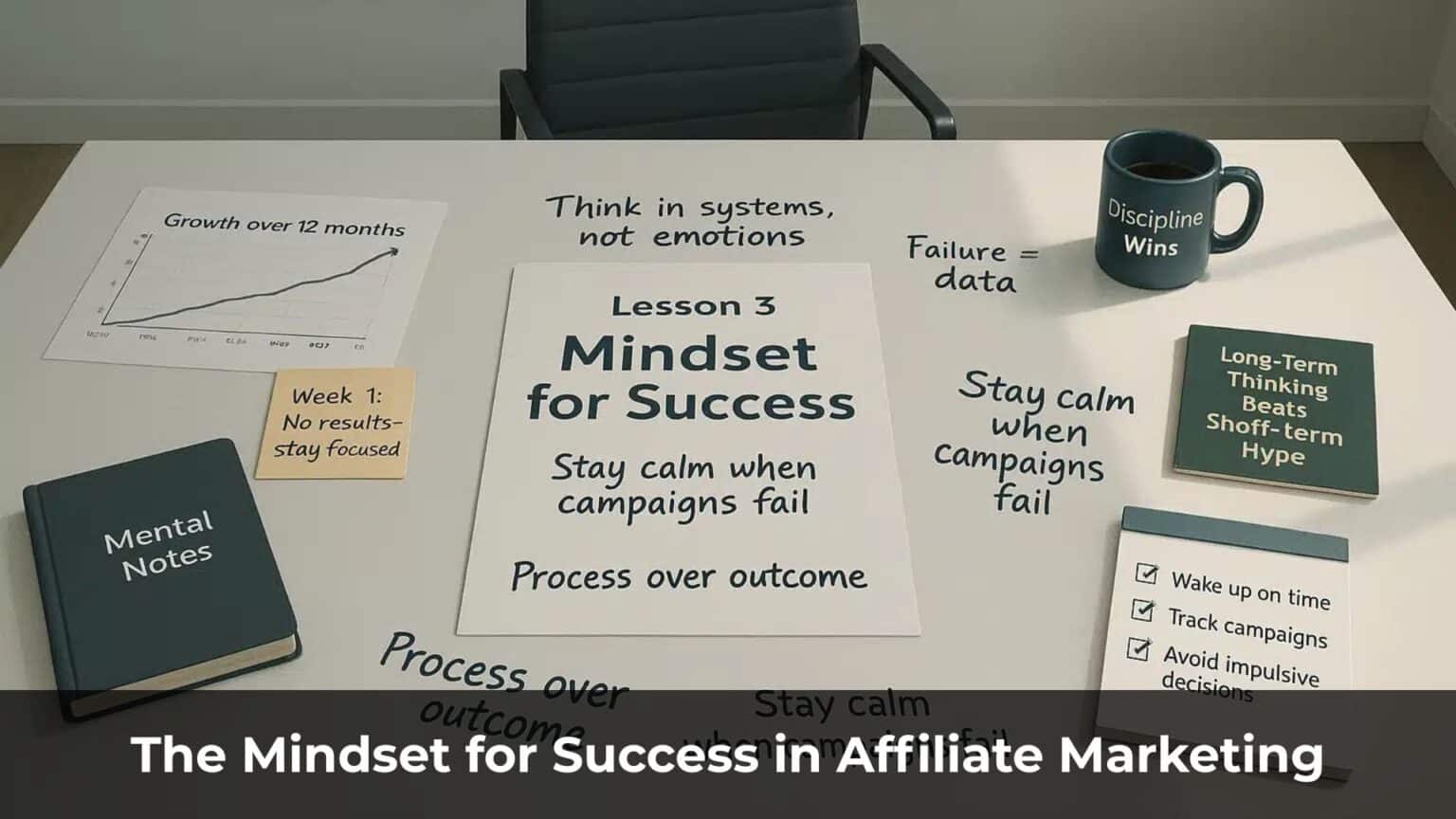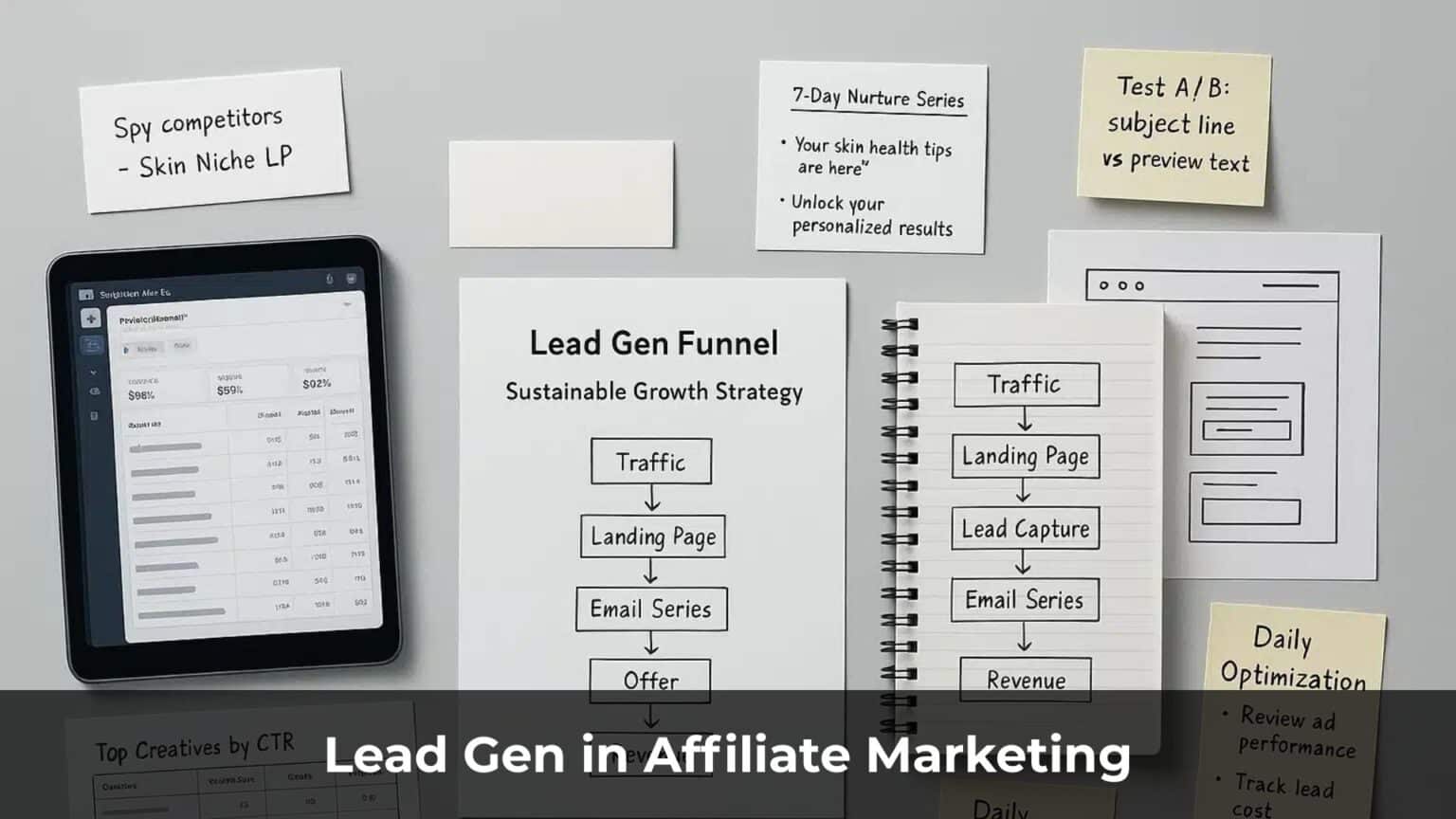You’re new to affiliate marketing and finally ready to launch your first campaign. You’ve done your homework, Googled the top affiliate networks, and started applying.
You hit “Submit” and wait.
Days go by. No response.
Then—an email finally lands in your inbox.
But it’s not what you hoped for.
Rejected.
Not just one. Every single network turns you down.
Maybe it’s because you don’t have enough traffic. Or maybe they only work with experienced affiliates.
Table of Contents
ToggleApplying to Affiliate Networks Is Like Applying for a Job
It’s a lot like being a fresh college graduate looking for your first job.
“How am I supposed to get experience if every company wants me to already have two years of experience?”
It’s a frustrating catch-22.
I’ve been thinking a lot about how tough this phase is for new affiliates—excited to start their journey, only to realize that getting accepted into a network often takes time and effort.
Over the years, affiliate networks have raised the bar. Their approval standards are stricter than ever. And if you’re brand new with no track record, it can feel nearly impossible to get in.
Here’s the thing: applying to an affiliate network is a bit like applying for a job—or even college. Okay, maybe not that intense, but still, you need to understand the process and present yourself in the best possible light.
So what exactly are affiliate networks looking for when they screen applicants? And how can you improve your chances of getting approved?
That’s what I’m going to break down for you in this article.
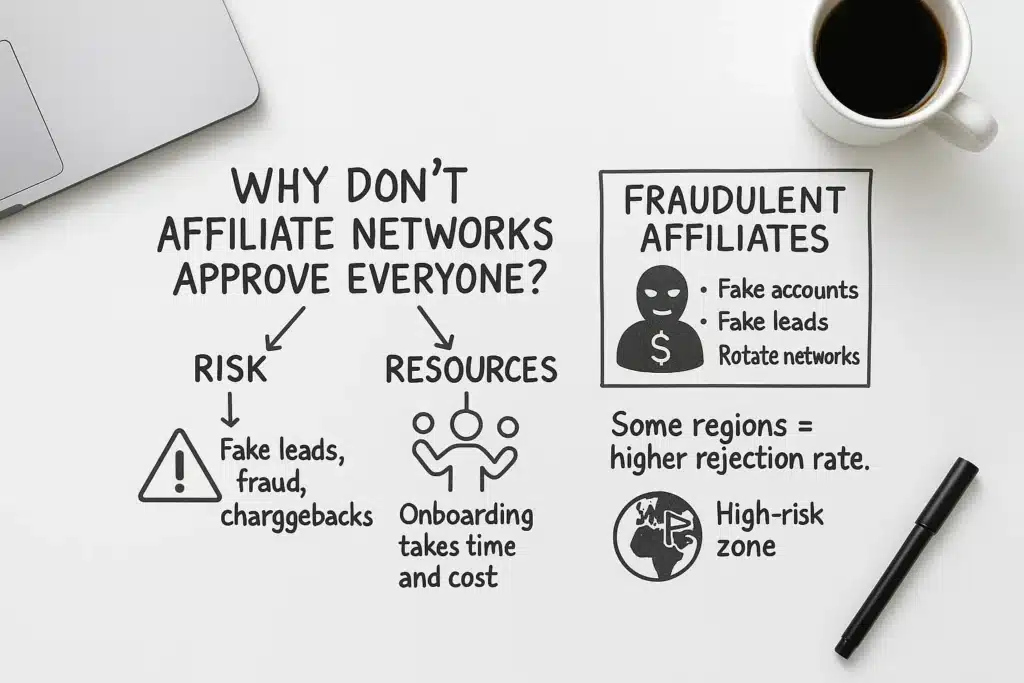
Why Don’t Affiliate Networks Approve Everyone?
You might be wondering, Why don’t affiliate networks just approve everyone?
Why wouldn’t they want me? I could end up becoming a super affiliate, right?
Well, there are two main reasons: risk and resources.
Every affiliate has the potential to make money for a network. And every network has the potential to help affiliates earn.
But from the network’s perspective, approving a new affiliate—especially one they know nothing about—is a risk.
Fraudulent Affiliates – Those who scam networks for profit
These are the people who create fake accounts, send fake leads, collect payouts—and get caught. Then they rinse and repeat the same scheme across other networks using different tricks.
Unfortunately, this is also one of the reasons it can be harder for you to get accepted if you’re from certain regions of the world.
If too many fraud cases come from a particular country, that country gets flagged as “high risk.”
Affiliates who run overly aggressive campaigns
By “aggressive,” we’re talking about misleading ads, deceptive claims, shady tactics, or anything that creates a poor user experience—just to turn a profit.
Let’s be honest: every affiliate gets a little aggressive sometimes. We all need to make a living, right? And playing it too safe rarely gets results.
But some affiliates take it way too far.
For example, if an affiliate runs ads using unauthorized images of celebrities, the network owner could end up facing lawsuits.
That’s why networks need to protect themselves. They simply can’t afford to bring on affiliates who might cost them money.

Limited Resources
Affiliate managers are a network’s most valuable resource—and their time and energy are limited.
That means they can’t support everyone.
Helping a brand-new affiliate figure out how to set up tracking on their landing page takes time away from working with pro affiliates who are already driving five-figure revenue daily.
Worse yet, some newbies ask 100 questions, spend weeks “researching,” but never actually launch a campaign or send a single click.
This is why some networks only want to work with experienced affiliates—or require proof of revenue before accepting your application.
How to Increase Your Chances of Getting Approved
Now that you understand why networks reject affiliates, let’s talk about what makes them want to approve someone.
Of course, every network dreams of bringing in clean, professional, “white-hat” affiliates who generate five figures a day.
But let’s be real—those affiliates are rare. So networks have to compromise.
Instead of chasing unicorns, they look for affiliates with potential—people who treat affiliate marketing like a real business, not just a side hustle.
They’re willing to invest time and resources to support you, but they want to make sure that investment will pay off.
That’s why they prefer working with affiliates who have a clear plan, take things seriously, and aren’t expecting hand-holding at every step.
The more experience you have—and the stronger your plan looks—the higher your chances of getting accepted.

Take the Application Process Seriously
I get it—filling out applications can be a pain. But if you rush through it or leave it half-baked, networks will question whether you have the professionalism to run paid traffic responsibly.
Don’t give one-word answers. Give them a reason to trust you.
For example:
How did you hear about us?
Bad answer: “Google.”
Good answer:
“I first found your network while searching on Google. After that, I spent time learning more—reading reviews in Facebook groups, browsing Affiliate Forum threads, and chatting with some affiliate friends. The more I learned, the more I realized this is the kind of network I’d like to work with.”
See the difference? It shows effort, curiosity, and intent.
If English isn’t your strong suit, get someone to help you clean up grammar and spelling. Or use AI to help you write a more polished message—just make sure it doesn’t sound robotic.
Give Specific, Thoughtful Answers
A lot of people give sloppy answers on affiliate applications. You can instantly stand out by being more specific and intentional with your responses.
One common question is: What traffic sources do you use?
Bad answer:
“Not sure. Google, Facebook, Push… whatever makes money. What’s working for you guys right now?”
Good answer:
“I’m currently focused on lead generation traffic and plan to scale using Facebook Ads once I’ve dialed in my quality. I’ve already spent around $2,500 testing campaigns on Facebook and have some hands-on experience with the platform.”
Clear. Confident. No fluff.
That kind of answer tells the affiliate manager you’re serious—and not just randomly trying your luck.
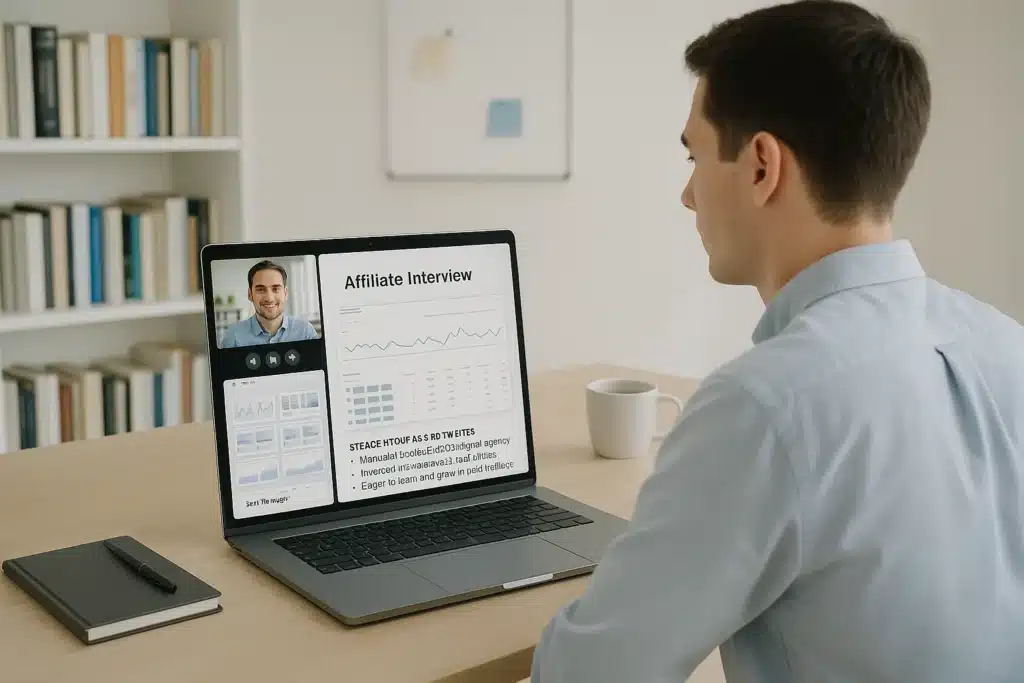
Highlight Your Strengths
Have you run traffic before? Mention the networks you’ve worked with—and if possible, include a few screenshots of your revenue or campaign results.
But what if you’ve never made a single dollar and have zero experience?
That’s okay. In that case, you need to show them your potential.
Do you have any relevant skills that could apply to affiliate marketing?
When I first started, I told them I had worked at a digital agency managing Google Ads accounts for a company. I didn’t have any affiliate experience—but I did have hands-on experience with paid traffic.
That matters.
Also, have you invested anything into your affiliate career yet?
If you mention that you’ve already put money into tools, trackers, or courses, it signals that you’re serious—and that alone can boost your chances of getting approved.
Do You Have Someone to Vouch for You?
Getting a referral from an existing affiliate can significantly improve your chances of getting approved.
Affiliate managers trust people their current affiliates trust. So if someone in the network can vouch for you, you instantly become less of a “cold” applicant and more of a qualified prospect.
Start by asking:
Are there any affiliates living near me? Can I join a local mastermind group or online community?
Reach out.
Offer to buy them coffee. Get to know them. Ask thoughtful questions. Learn how they work.
Don’t pitch or beg—just be genuine. Most successful affiliates remember how hard it was in the beginning, and many are willing to help if they see you’re serious.
One good relationship could open doors that cold applications never will.

Call Them After You Apply
Once you’ve submitted your application, don’t just sit back and wait. Take the extra step—reach out directly.
Most affiliate networks list their contact info on their website. That could be a phone number, Facebook profile, or Telegram handle. Use it.
Why? Because making a quick call—or even just sending a message—shows that you’re serious. It puts a voice or face to your application and separates you from the flood of faceless forms they receive every day.
You can say something simple like:
“Hey, I just submitted an application and wanted to introduce myself. I’m really excited about the opportunity and happy to answer any questions you might have.”
That kind of initiative goes a long way, especially for smaller or mid-size networks where real human connection still matters.
Start with Smaller Steps
I have a friend who wanted to get into a top university.
But his grades weren’t good enough, and he got rejected. So he enrolled in community college first—then later transferred into the university he originally wanted.
Affiliate marketing works the same way.
Let’s say the network you’re applying to requires $500 in weekly revenue.
You’re not there yet? That’s okay.
Start with a network that’s more beginner-friendly. Work with them. Get some campaigns running. Build real results.
Once you’ve proven yourself, circle back to the original network. This time, you’ll have screenshots, stats, and experience to show them.
Instead of being “just another newbie,” you’ll look like someone who’s taken action—and that changes everything.

Use Your Existing Website or YouTube Channel (If You’re an SEO Affiliate)
If you’re doing SEO—or building organic content through blogging or YouTube—you already have a big advantage.
Affiliate networks love working with people who own their traffic sources. So if you have a website or channel that already gets consistent visitors, that’s one of the easiest ways to get approved.
You don’t even need huge numbers. Just show them you’re actively building something real.
Better yet, offer to create a product review or comparison post featuring one of their offers. If you’re a YouTuber, offer to do a video review or tutorial. This shows initiative—and gives the network a reason to work with you, even if you don’t run paid ads.
Owning content + audience = instant credibility.
Final Thoughts: Make It a Win-Win
There’s a simple truth in business—and in life:
If you want something, help others get what they want first.
Applying to affiliate networks is no different from applying for a job.
Instead of approaching it with a mindset of “What can they give me?”, try putting yourself in the shoes of the affiliate manager.
What are they looking for? What concerns do they have? What would make you a safe, reliable, and profitable partner?
Once you understand that, you’ll know how to position yourself—not as another random applicant, but as someone who brings real value.
That’s how you create a win-win situation. And in affiliate marketing, win-win is where the long-term partnerships—and real profits—begin.

